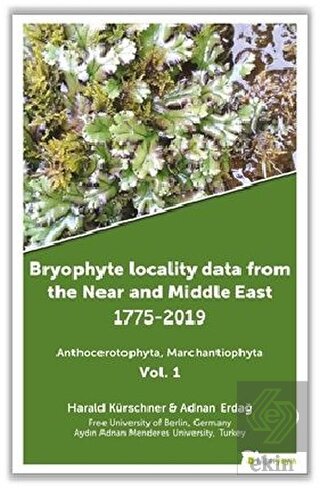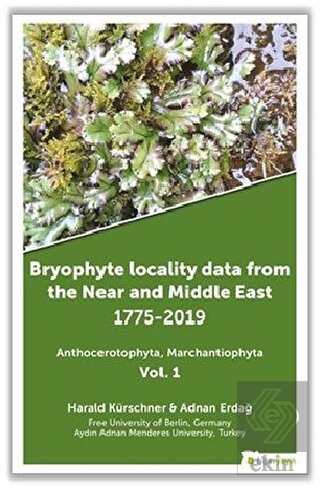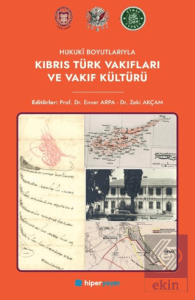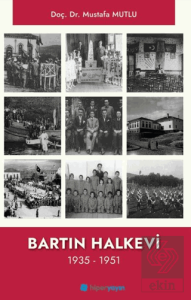
Bryophytes (liverworts, mosses and hornworts) belong to a group of mostly very small organisms that often are neglected and/or overlooked. They play an important and outstanding role in many habitats in nearly all countries and landscapes and are found in the understory of forests and woodlands, as pioneers on soil and rock, in steppes and deserts (organisms of "harsh environment"), in swampy areas and bogs, or as epiphytes on tree trunks. Today they often serve as indicators of successional stages, ecological disturbances and air pollution. Knowledge of species and its distribution therefore is essential to answer tools for future studies such as floristic inventories and species catalogues, community structure and composition, biomonitoring, natüre conservation, life history traits (morphological, anatomical and physiological adaptations), and biochemical compounds (secondary metabolits, antimycotica). Its distribution and occurrence at present and in former time is of basic importance in understanding phytodiversity and eco-system development, function and changes, especially with regard to increasing human influence and global warming. The 'Bryophyte locality data from the Near and Middle East' covering Afghanistan, Bahrain, Iran, Iraq, Israel, Jordan, Kuwait, Lebanon, Oman, Qatar, Saudi Arabia, Sinai Peninsula, Syria, Turkey, United Arab Emirates and Yemen (incl. Socotra), summarizes all published data from the beginning of the collection activities (e.g., Forsskål 1775) till the end of 2019 and is the first comprehensive data base for this organisms. As scientific interest in bryophytes drastically increases recently, especially in Iran and Turkey, the ongoing interest stimulates us, to prepare this kind of data base and to provide a solid background of what is known in the different countries of the Near and Middle East. It is a further step to integrate Southwest Asia into the Global Network of floristic knowledge and the tools of the Global Strategy for Plant Conservation.
Bryophytes (liverworts, mosses and hornworts) belong to a group of mostly very small organisms that often are neglected and/or overlooked. They play an important and outstanding role in many habitats in nearly all countries and landscapes and are found in the understory of forests and woodlands, as pioneers on soil and rock, in steppes and deserts (organisms of "harsh environment"), in swampy areas and bogs, or as epiphytes on tree trunks. Today they often serve as indicators of successional stages, ecological disturbances and air pollution. Knowledge of species and its distribution therefore is essential to answer tools for future studies such as floristic inventories and species catalogues, community structure and composition, biomonitoring, natüre conservation, life history traits (morphological, anatomical and physiological adaptations), and biochemical compounds (secondary metabolits, antimycotica). Its distribution and occurrence at present and in former time is of basic importance in understanding phytodiversity and eco-system development, function and changes, especially with regard to increasing human influence and global warming. The 'Bryophyte locality data from the Near and Middle East' covering Afghanistan, Bahrain, Iran, Iraq, Israel, Jordan, Kuwait, Lebanon, Oman, Qatar, Saudi Arabia, Sinai Peninsula, Syria, Turkey, United Arab Emirates and Yemen (incl. Socotra), summarizes all published data from the beginning of the collection activities (e.g., Forsskål 1775) till the end of 2019 and is the first comprehensive data base for this organisms. As scientific interest in bryophytes drastically increases recently, especially in Iran and Turkey, the ongoing interest stimulates us, to prepare this kind of data base and to provide a solid background of what is known in the different countries of the Near and Middle East. It is a further step to integrate Southwest Asia into the Global Network of floristic knowledge and the tools of the Global Strategy for Plant Conservation.
| Taksit Sayısı | Taksit tutarı | Genel Toplam |
|---|---|---|
| Tek Çekim | 655,70 | 655,70 |
| 2 | 340,96 | 681,93 |
| 3 | 236,05 | 708,16 |
| Taksit Sayısı | Taksit tutarı | Genel Toplam |
|---|---|---|
| Tek Çekim | 655,70 | 655,70 |
| 2 | 340,96 | 681,93 |
| 3 | 236,05 | 708,16 |


















